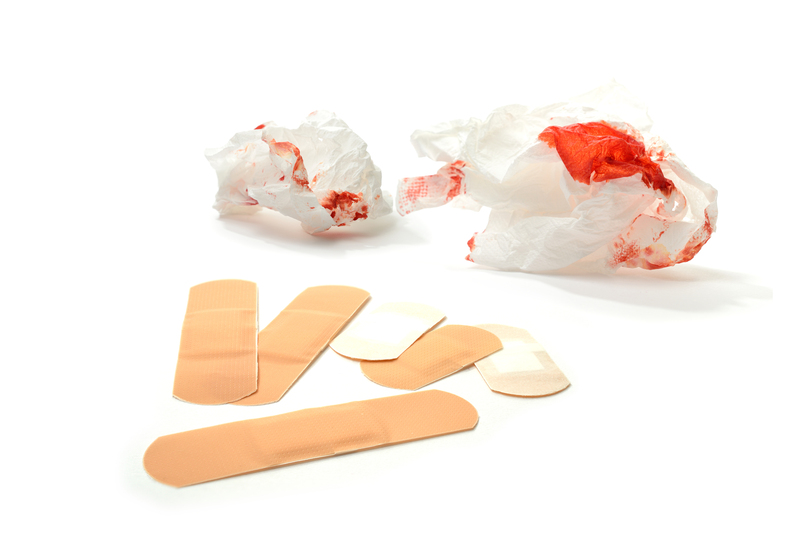Ensuring Your Jewellery Remains Sparkling with the Right Methods
Posted on 10/09/2025
Ensuring Your Jewellery Remains Sparkling with the Right Methods
Your favourite jewellery deserves to maintain its dazzling brilliance all year round. Whether it's a cherished heirloom ring, diamond studs, or a statement necklace, each piece adds a touch of magic to your look. But, with time and exposure to various elements, even the highest quality jewels can lose their luster. In this guide, discover the most effective methods to ensure your jewellery stays sparkling and beautiful, extending its life and glamour.

Understanding Why Jewellery Loses Its Sparkle
Before diving into how to keep your jewellery shiny, it's vital to understand what causes gems and metals to look dull or tarnished. Knowing these factors means you can take better steps to prevent them:
- Dirt and grime build-up: Everyday wear and contact with skin oils, sweat, lotions, perfumes, and dust can cause grime to accumulate, diminishing shine.
- Oxidation and tarnish: Silver and certain gold alloys react with oxygen and moisture, leading to discolouration and a darkened appearance.
- Hard water deposits: Minerals from hard water may adhere to gems and metal, creating a cloudy film over time.
- Physical scratches: Storing pieces together or contact with abrasive surfaces can scratch metals and softer gemstones.
The Importance of Regular Maintenance
Jewellery is an investment--both financially and sentimentally. Proactive care ensures your treasures always look their best, and regular cleaning prevents stubborn build-up. Furthermore, routine inspections can help catch weak clasps or loose prongs before costly damage occurs.
Top Tips for Keeping Your Jewellery Sparkling
1. Clean Your Jewellery Gently But Regularly
Cleaning is essential to maintaining the shine of your jewellery. However, many cleaning myths or abrasive techniques can do more harm than good. Proper, regular cleaning can revive even the dullest gems or metals.
- Gold: Soak in warm, soapy water (use a mild dishwashing liquid), gently brush with a soft-bristled toothbrush, and rinse with clean water. Pat dry with a soft cloth.
- Silver: Use a commercial silver cleaner or make a paste with baking soda and water, applying gently. Rinse and polish with a microfiber cloth.
- Diamonds & Gemstones: Clean with warm water and mild soap, using a brush to get under the settings. Avoid soaking porous stones like pearls, opals, or turquoise.
- Pearls: Wipe after each wear with a damp, soft cloth; avoid harsh chemicals or soaking, as they are highly porous.
2. Store Jewellery Properly to Prevent Tangling and Scratches
How you store your jewellery matters significantly for ensuring it remains sparkling. Use a compartmentalized jewellery box or soft pouches to prevent different pieces from touching and causing scratches. Anti-tarnish strips or pouches help preserve silver items.
- Store in a dry place: Humidity accelerates tarnishing, so keep jewellery in a cool, dry environment.
- Separate pieces: Individual compartments or pouches prevent chains from tangling and stones from scratching each other.
- Keep original boxes: For precious or sentimental items, store them in their original cases to best protect them.
3. Avoid Exposure to Chemicals
Chemicals found in perfumes, hairsprays, lotions, and household cleaners can tarnish or permanently damage jewellery. To ensure your jewellery stays shiny and unblemished, always remove pieces before using chemicals or engaging in activities like swimming in chlorinated pools.
- Apply cosmetics and skincare products before putting on your jewellery.
- Take jewellery off before cleaning, exercising, or swimming.
- Wipe your pieces with a clean, soft cloth after wearing to remove any residues.
4. Know When to Remove Your Jewellery
Certain activities put your jewellery at risk of accidental damage, buildup, or loss. Being mindful about when you wear your treasures can greatly ensure their sparkle and longevity.
- Household chores: Activities like washing dishes, gardening, or using cleaning products can damage metals, stones, and settings.
- Physical workout: Sweat, impact, and abrasion during sports or workouts may cause tarnish or loss of stones.
- Bathing or swimming: Water, soaps, shampoo, and chlorine all impact jewellery's brilliance and durability.
The Best Jewellery Cleaning Techniques: Expert-Approved Methods
Safe DIY Cleaning Methods
Cleaning your jewellery at home is both cost-effective and practical. However, each material requires an appropriate cleaning method to avoid damage:
- Soapy Water Method: Fill a bowl with lukewarm water and add a few drops of gentle dishwashing liquid. Soak jewellery for 10-20 minutes, then brush gently with a soft toothbrush. Rinse in clean water and dry with a lint-free cloth.
- Baking Soda Paste (for Silver): Mix three parts baking soda with one part water and gently rub the paste onto tarnished silver using a cloth or sponge. Rinse and buff dry.
- Aluminium Foil & Baking Soda Soak: Line a bowl with foil, add hot water, a tablespoon of baking soda, and a pinch of salt. Add silver pieces and let sit for five minutes. The tarnish will transfer from the jewellery to the foil!
- Jewellery Polishing Cloths: Specially designed cloths contain agents that clean and polish at the same time, suitable for most metals.
For gems like emeralds, opals, and pearls, stick to the gentlest cleaning methods--usually just a soft, damp cloth. Never ultrasonic clean organic gems or soft stones!
Professional Cleaning Services
Occasionally, it's worth entrusting your precious items to professional jewellers. They use ultrasonic machines, steam, and expert polishes to restore pieces to their original brilliance. They can also inspect for loose stones or setting issues, ensuring your jewellery remains in sparkling, safe condition.
Ultrasonic Cleaners: When to Use Them
These devices use high-frequency sound waves to clean intricate settings and remove debris from hard-to-reach spots. While safe for diamond, gold, and platinum, avoid using them with porous stones (like opal) or antique pieces, as they may loosen glue or damage delicate settings.
Common Jewellery Materials and Their Care Needs
Gold Jewellery
Gold is less prone to tarnish but can scratch easily. Use mild soap and water for cleaning and polish with a soft cloth. Store separately to avoid surface scratches. Gold-plated pieces require extra care--avoid abrasive cleaning, as this can remove the outer gold layer.
Silver Jewellery
Silver reacts with air and moisture, causing tarnish. Use anti-tarnish pouches for storage and clean with a dedicated silver polish or a homemade baking soda paste. Wipe after every use to minimise tarnish buildup.
Diamond Jewellery
Diamonds are incredibly hard but can still collect grease and grime. Regular, gentle cleaning keeps them sparkling. Check prongs and settings often, as oil and water can sometimes cause stones to loosen.
Pearls and Other Organic Gems
Pearls are especially delicate due to their porous surface. Wipe with a soft, damp cloth after each wear, and store flat in their own pouch. Avoid chemical contact entirely, and never immerse pearls in water or cleaning solutions.
Coloured Gemstones
Gemstones vary widely in hardness and structure. Know your stone--rubies and sapphires can withstand gentle soap and water, but emeralds, opals, and turquoise require a dry or slightly damp cloth only.
Boosting Your Jewellery's Lifespan: Preventive Strategies
Inspect Regularly for Wear and Tear
Loose stones, bent prongs, or damaged clasps can quickly escalate into lost pieces or irreparable damage. Make a habit of checking your jewellery every few months, and have a professional assess high-value items at least once a year.
Rotate Your Jewellery
Wearing the same item daily increases wear. Rotate your collection to minimise the impact on any single piece--giving your jewellery a rest keeps it beautiful for longer.
Insure High-Value Pieces
Consider jewellery insurance for expensive or sentimental items. In case of theft, loss, or sudden damage, insurance can provide you peace of mind and financial protection.

Frequent Questions on Jewellery Care
How often should I clean my jewellery?
- *Everyday-wear items* (e.g., engagement rings) benefit from weekly cleaning; others can be cleaned monthly or as needed.
Can I use toothpaste to clean jewellery?
- No. Toothpaste is abrasive and can scratch most gemstones and metals. Opt for targeted jewellery cleaners or mild soap and water instead.
What is the safest way to clean gold-plated jewellery?
- Use a warm, damp cloth to gently wipe. Avoid scrubbing or any abrasive materials that might remove the thin gold layer.
Conclusion: Keep Your Jewellery Sparkling for Years to Come
Ensuring your jewellery remains sparkling with the right methods is a blend of proactive care, regular gentle cleaning, and smart storage. Knowing your metals and gemstones, and following expert-recommended techniques, will keep your collection looking its finest for years--maybe even generations--to come. Treat each piece with care, and it will reward you with endless brilliance and beauty.
- Clean routinely.
- Store smartly.
- Handle with care.
- Seek professional help as needed.
For more advice on jewellery care or to discover stunning new pieces, explore reputable jewellers who understand the importance of preserving sparkle. Your treasured pieces are worth it!




